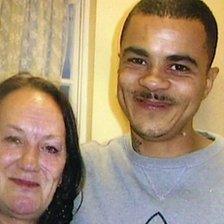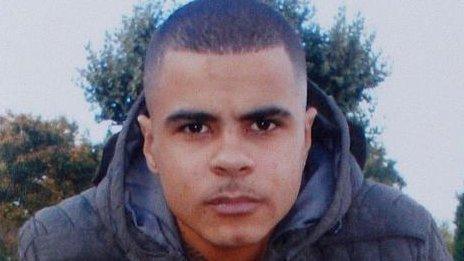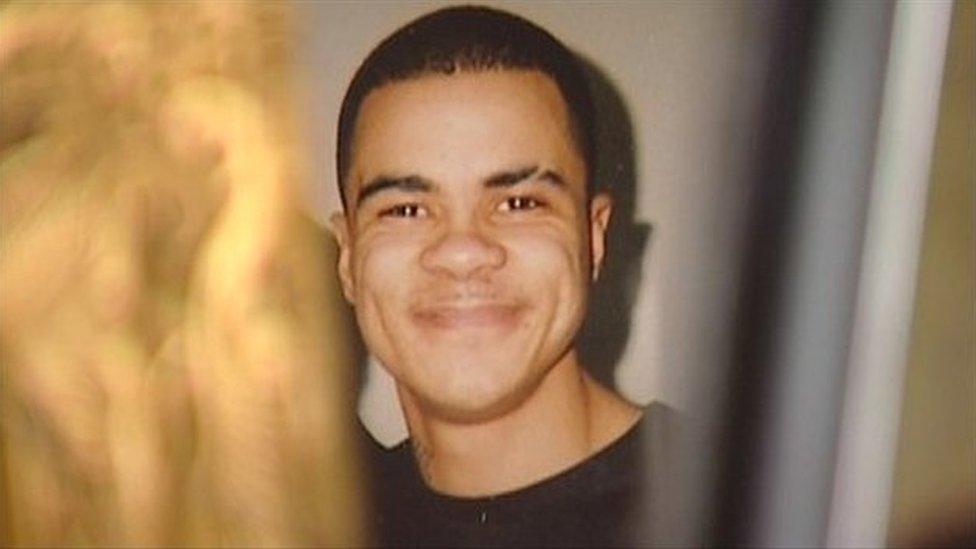Mark Duggan lawful killing verdict upheld
- Published
BBC London's Nick Beake reports
The mother of Mark Duggan has lost a High Court bid to overturn a finding that her son was "lawfully killed".
Mr Duggan's death sparked nationwide riots after he was shot by a police marksman.
In January an inquest jury found Mr Duggan, 29, was lawfully killed in August 2011 in Tottenham, north London, despite being unarmed.
Three judges dismissed Pamela Duggan's application for judicial review, but her solicitor said she would appeal.
In a separate development, Ms Duggan has launched a legal action challenging whether officers should be allowed to confer before a court case involving police fatality.
During the inquest, Ms Duggan had accused the coroner Judge Keith Cutler of misdirecting the jury.
Mr Duggan's aunt Carole Duggan said the family was "extremely disappointed" with the High Court ruling.
Referring to the riots which followed Mr Duggan's shooting, she said: "We are being punished because of the uprisings of 2011 and are not getting a fair trial. We are not accepting this.
"The verdict was perverse. It just didn't add up. It didn't make sense. How can somebody who is unarmed be lawfully killed?
"He didn't get a fair hearing."
'We're not complacent'
Sir Brian Leveson, president of the Queen's Bench Division, who heard the case with Mr Justice Burnett and Judge Peter Thornton QC, said the court "recognised the tragedy" of the loss of Mr Duggan's life - but ruled that none of the grounds of challenge had been established.
Pamela Duggan's solicitor Marcia Willis Stewart said Ms Duggan, who was not at London's High Court for the ruling, had asked her to say that she was lodging an appeal.
The solicitor said: "She remains deeply distressed about the death of her son and the circumstances in which it occurred and has instructed the legal team to lodge an appeal".
The Metropolitan Police released a statement following the announcement, saying that tackling those believed to be armed "always carries a risk".
"We are not complacent; our primary aim is keeping Londoners safe, and we recognise the considerable and devastating impact of gun crime on those affected by it," it said.
"We will continue to learn and develop our methods for firearms operations to keep Londoners safe."

Mark Duggan's mother said he was shy when he was younger
Gun in sock
Two top QCs had fought on behalf of the Duggan family for the lawful killing verdict to be replaced with an open verdict - or for a fresh inquest to be held.
Michael Mansfield QC, who appeared with Leslie Thomas QC, told a packed court at a two-day hearing in July that the "nutshell" of the case was to be found in the question: "How is it a man who is manifestly unarmed can be lawfully shot?"
An officer can only legally open fire if he honestly believes there is an imminent risk to his own life or to others.
Lawyers for the coroner said a gun, contained in a sock, was found on grass in the vicinity of Mr Duggan's body, and there was "a significant issue" about how it got there.
In the conclusion to the High Court ruling, Sir Brian said that, although the ruling and the initial inquest verdict "exonerate the police on the criminal and civil standard of proof in relation to unlawful killing on the criminal test for such liability", they did not relieve the Met Commissioner and his officers from any civil liability.
The judge said: "As we have sought to make clear, it was not the purpose of the inquest to determine civil liability.
"In civil proceedings the burden of proof and the ingredients are different and may - we do not say must or will - provide a different answer to the very difficult questions posed by this case."
Ms Duggan's separate legal action is focused on the guidance provided to police officers on whether they can confer before a court case involving police fatality.
Her lawyers say the Independent Police Complaints Commission has decided that key officers involved in a death should normally be separated from one another, but that this runs contrary to the policy of the Association of Chief Police Officers (Acpo).
Hugh Southey QC is seeking a declaration on Ms Duggan's behalf that Acpo is acting unlawfully and contrary to Article 2 of the European Convention on Human Rights.
- Published8 January 2014

- Published27 October 2015
